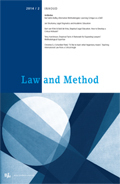|
In 2010 verscheen het rapport Kwaliteit & diversiteit van de Commissie Koers die het wetenschappelijk onderzoek van negen Nederlandse juridische faculteiten beoordeelde. De conclusie van het rapport is dat het ‘goed’ gaat met het rechtswetenschappelijk onderzoek in Nederland, maar tegelijkertijd ziet de Commissie ‘een discipline in transitie’. De Commissie dringt er bij de decanen van de faculteiten op aan om veel meer te gaan samenwerken. Als uitgesproken ‘zwak’ benoemt ze het gegeven dat er binnen de discipline geen algemeen gedeelde opvatting bestaat over de wetenschappelijke kwaliteit op grond waarvan onderzoeksresultaten beoordeeld kunnen worden. In deze bijdrage blikt de auteur aan de hand van de bevindingen van de Commissie Koers terug en trekt hij lijnen naar de toekomst. Volgens hem verdient vooral de externe oriëntatie aandacht: de wetenschappelijke verantwoording (peer review, ranking, impactmeting), de steeds belangrijker wordende maatschappelijke verantwoording, en de thematisering van het juridische onderzoek (de Europese ‘grand challenges’ en de Nederlandse topsectoren). |


Law and Method
About this journalSubscribe to the email alerts for this journal here to receive notifications when a new issue is at your disposal.
| Editorial |
|
| Authors | Sanne Taekema and Bart van Klink |
| Author's information |
| Miscellaneous |
|
| Authors | Sanne Taekema and Bart van Klink |
| Author's information |
| Article |
|
| Keywords | rechtswetenschappelijk onderzoek, peer review, ranking, methodologie, grand challenges |
| Authors | Carel Stolker |
| AbstractAuthor's information |
| Article |
|
| Keywords | Latour, modernity of law, legal procedure, proof, qualification of facts |
| Authors | Niels van Dijk |
| AbstractAuthor's information |
|
In this article the author presents Latour’s negative analysis of modernity and his positive ethnographical studies of the modes of existence of our modern world. I will discuss the merits and disadvantages of his specific approach on law – an institutional ethnography of the French Conseil d’Etat – within this framework. The analysis will be supplemented with the results of a conflict-based approach to a case study in patent law at a law firm. |
| Article |
|
| Keywords | legal education, legal research skills, legal research methods, Utrecht School of Law |
| Authors | Ian Curry-Sumner and Marieke van der Schaaf |
| AbstractAuthor's information |
|
The aim of this article is to present a case study of the development process and its underlying theoretical fundaments of a research skills line in the law degree programme. Broader educational purposes of the article are to give managers and lecturers of law schools suggestions for implementing research skills in their curriculum. Accordingly, the article is aimed at stimulating students’ research skills. This article will discuss the background to the decisions that were made in the Utrecht School of Law, then discuss the ultimate end result, namely the implementation of a new research skills line and the publication of a standard research skills instruction. Furthermore, each section will commence with a brief outline of the theoretical framework, followed by an explanation of how this theory has been practically implemented in the Bachelor of Law in Utrecht. |
| Article |
|
| Keywords | juridisch onderzoek, empirisch onderzoek, praktijkgericht onderzoek, onderzoeksvraag, onderzoeksmodel |
| Authors | Geertje van Schaaijk |
| AbstractAuthor's information |
|
In dit artikel wordt de stelling verdedigd dat in een praktijkgericht juridisch onderzoek zowel juridische als empirische onderzoeksmethoden nodig zijn. De centrale onderzoeksvraag in een praktijkgericht juridisch onderzoek dient immers gerelateerd te zijn aan het recht en aan de praktijk, zodat het antwoord op de centrale vraag praktisch bruikbaar is. Vragen van het type ‘mag dat?’ of ‘werkt dit?’ kunnen die relaties met recht en praktijk goed over het voetlicht brengen en sturing geven aan de richting van het onderzoek. In het beredeneerde antwoord op de onderzoeksvraag komt de integratie van methoden en technieken uit de juridische en sociaalwetenschappelijke discipline tot uitdrukking. Het onderzoeksmodel dat in dit artikel wordt uitgebeeld en toegelicht, maakt deze integratie duidelijk en biedt een basis voor een methodologie van praktijkgericht juridisch onderzoek. |
| Book Review |
|
| Authors | Yvonne Denissen-Visscher |
| AbstractAuthor's information |
|
|
| Book Review |
|
| Authors | Klaas Rozemond |
| Author's information |

 Issue 1
Issue 1